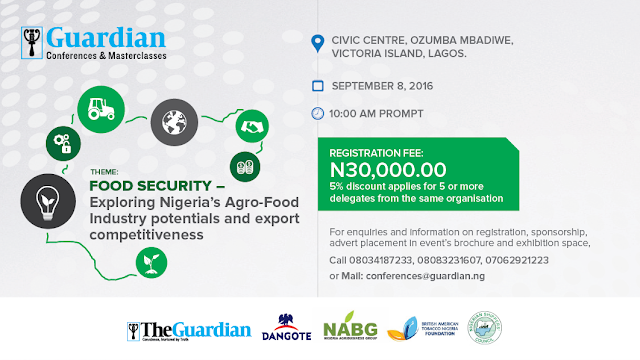In the face of Nigeria’s economic realities, where virtually all macro-economic and fiscal indices are trending negative – low oil prices, naira depreciation by almost 25 per cent, spiraling inflation, capital market bearish performances, exchange rates devaluation and the dwindling foreign reserves, and financial sector performance confirming the current adverse economic reality. All of this has led to a considerable slowing of GDP growth. Outlook for growth in 2016 is weak and several key sectors including oil & gas, manufacturing and government are already in recession, while most others are experiencing sharp slowdowns.
Business Case:
The collapse in oil prices has significant implications for the agriculture sector. After years of neglect, agriculture and agribusiness is once again seizing the attention of African governments, business leaders, investors and other partners. Agriculture and agribusiness together are projected to be a $1 trillion industry in sub-Sahara Africa by 2030. Agribusiness can play a significant role in jump starting Nigeria’s economic diversification and competitiveness through provision of much needed jobs, revenue and foreign exchange incomes. But this critical sector still lacks the support it deserves.
The Solution:
In view of the challenge above, Guardian Conferences, a strategic business division and an adjacent company of The Guardian Newspaper, as part of its Economic Forum Series on Nigeria’s economic diversification and competitiveness, and in partnership with Nigeria Agribusiness Group (NABG) as knowledge and content partners, will organize its first Agribusiness Forum with the theme -
Food Security- Exploring Nigeria’s Agro-food industry potentials and export competitiveness.
Conference Objectives:
1. Discussion and review of the role of the private sector in improving food access and increasing agricultural productivity.
2. Discussions on existing and new ‘market-friendly’ policies and regulatory environment needed for inflow of more private sector investments in local agribusinesses and food security.
3. Debate issues face by smallholder farmers in the areas of agribusiness financing, capacity building, trade and access to new markets.
4. To contribute to an ongoing discussion on how to empower the private sector and migrate businesses from subsistent farming to sustainable commercial farming through mechanization.
5. Highlight the importance of small holder farmer’s inclusion in large sector value chains.
6. Discussions on how to strengthen the linkages along the supply chain management in the agro-food industry.
7. Discussions on the role of technology and other strategies in increasing the value of Nigeria’s agricultural produce from commodity to high-end.
8. Highlighting the sources of Agro-based revenue currently untapped by Nigeria’s Agribusiness sector.
9. Discussions on the role of the Nigerian Maritime Industry in opening Nigeria’s Agri-produce to Global Markets
Conference Features:
· Thought leadership presentations
· Valuable face to face interaction with industry peers and potential clients
· Expert Analysis and lively panel discussions
· Networking opportunities and relationship building
· Business to business meetings
· Media Exposures, brand building and other strategic marketing opportunities
Delegates Profile:
Government officials, Policy makers, Agribusiness SMEs, Small Holder Farmer groups, Commercial banks, Microfinance banks, Development banks, Private equity investors and Venture capitalists, Farmer cooperative societies, Agro-allied industries, Retailers, NGOs, Academicians, Researchers, Donor Agencies, Corporate bodies and individuals etc.
Details of the conference:
Date: Thursday, September 8, 2016
Venue: Civic Centre, Ozumba Mbadiwe, Victoria Island, Lagos
Time: 10am prompt





Comments
Post a Comment
Contact me for Adverts/Tipoff
Email: lorejobi@gmail.com